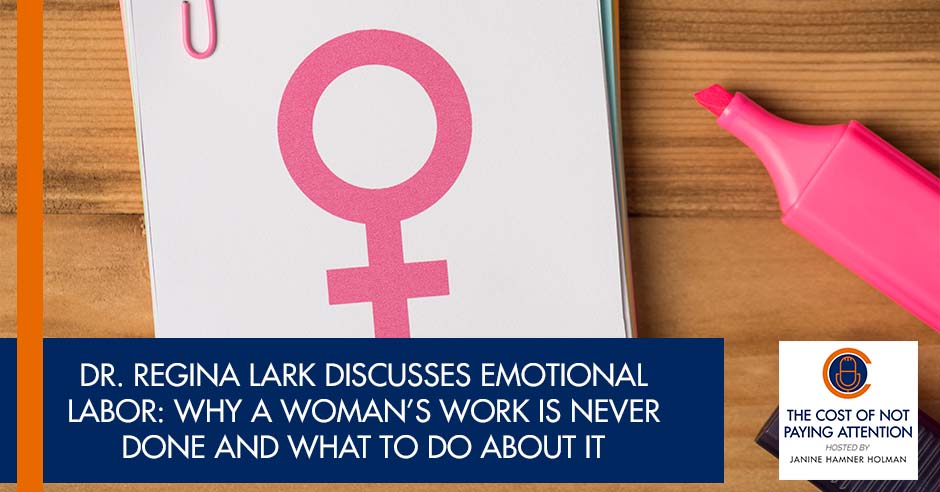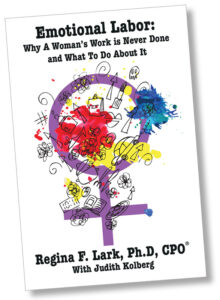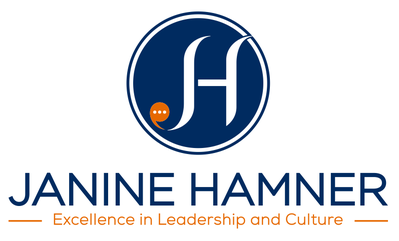
Since time immemorial, women alone have carried the weight of emotional labor that benefits societies at large. Still, their work remains invisible and unrecognized. The cost? Their own emotional wellbeing. What can we do to change that? In this episode, Janine Hamner Holman sits down with Dr. Regina Lark for a probing and insightful conversation on gender expectations when it comes to handling emotional and social issues. Regina is a featured speaker and educator on issues ranging from productivity, hoarding, and women’s leadership. Tune in as she discusses insights from her latest book, Emotional Labor: Why A Woman’s Work is Never Done and What To Do About It.
HOST: Janine Hamner Holman | [email protected] | LinkedIn, Facebook, and Twitter | Subscribe to my Newsletter! | Book me to Speak!
—
Listen to the podcast here:
Dr. Regina Lark Discusses Emotional Labor: Why A Woman’s Work Is Never Done And What To Do About It
Welcome to the show. What am I paying attention to now? Friendship. In my car, coming to the office, I heard Celine Dion’s Because You Loved Me. I have always thought of that as a wedding song. It is Celine Dion. She has an epic voice but is sappy. I was listening to the lyrics and it is all in the past tense, “I’m everything I am because you loved me.” First, I was thinking about my mom and I have decided that for Mother’s Day, I’m going to get the lyrics to that song, write it out for her, frame it, and have that be her Mother’s Day gift.
I was thinking about all of the people in my life. I am who I am because they loved me. I was thinking about the people who are in my life and who are not in my life now, and that brings me right to our guest for this episode. I had known Dr. Regina Lark casually. I knew people who knew her, and we had been at things together but we didn’t know each other, so we decided that we were going to get to know each other.
She said to me, “We should be friends,” and I said to her, “That is so awesome. I love it. Let’s be friends.” I do not know about you all, but I do not do that very much anymore as a grownup. I did that a lot as a child. We have that instinct or knowing that we need a tribe, cheerleaders, a squad or people we get to be who we are and more of who we are because they love us. I want to tell you a little bit about Regina and then I want to bring her in.
Dr. Regina Lark founded A Clear Path back in 2008. It is a professional organizing and productivity organization. She is a featured speaker and educator on issues ranging from productivity, hoarding and women’s leadership. She is a specialist in Boomer and senior downsizing, residential organizing, and life transitions. In October 2021, Regina published her third book, Emotional Labor: Why a Woman’s Work is Never Done and What To Do About It. For fun, she plays golf and tennis, and writes goofy songs about clutter. When you hear that she writes goofy songs about clutter, don’t you immediately feel jealous of me that I get to be her friend? How awesome is that? Welcome to the show, Regina.

Emotional Labor: Why A Woman’s Work is Never Done and What To Do About It – https://emotional-labor.com/
Thank you so much. What an intro.
You are welcome. I want to start the way that I start with most of our guests. What is something that you are paying attention to that you have noticed other people are not paying as much attention to, either intentionally or unintentionally, and what is the cost of that inattention?
I read an article by one of my hero thought leaders, Gemma Hartley. She had a piece in the Huffington Post, and the title of the article was Moms Don’t ‘Deserve’ Wine. We Deserve Better Than This. At the beginning of the article, she describes what it was like during the pandemic. It was very transparent and it related to major wine consumption starting earlier and earlier, and then groups of women getting together, finishing a few bottles without batting an eye. With that, they lament, “We deserve this downtime. We deserve this time with each other. We deserve the wine time.” What Hartley’s article points out, and what I think about a lot, are the ways in which modern society here in the United States continues to not have any good plan for ameliorating the weight of the workload on the shoulders of American women. It is devastating.
Corporate America entered our living rooms during the pandemic. Flextime took on a whole new meaning. Work from home, which was usually a pejorative, and then wanted to do that is now happening. All of that had to do with a lack of a social structure to deal with the ubiquitous and huge amount of caregiving that goes on in every household, mostly by women. That is what I’m thinking about. Gemma’s article confirmed that we should all still be thinking about this, talking about it, and doing something about it.
Emotional labor is invisible. It is unwritten. No job description per se but it's the longest job description in history. It's unwaged. It's work that is surprisingly undervalued and yet hugely valuable to the wellbeing of our society, of culture, of… Share on XYou point to so many different things in that, which is one of the reasons that I am falling completely in love with you. You have such a big brain, which is one of my favorite things in humans. It goes in so many different directions. Towards the end of 2021, this would have been in early September, I was on a call with someone who is a brilliant executive coach. I was talking about how I was looking forward to a vacation. I had not had a vacation in so long, and how great I was going to be when I got back from vacation like it was going to be this miracle drug.
He said to me, “I think you have got a little bit of miracle thinking going on here about the transformation that vacation is going to create. What if you figured out ways to get a little bit of vacation every week?” He told me that he blocks out in his calendar Tuesday and Thursday afternoons and goes flying a kite, which I thought was so great on so many levels. He’s blocking out little periods that takes like two hours each Tuesday and Thursday.
I have tried to do that by blocking out little periods of time. It has not worked for me. My happy place is the beach. It is the place that rejuvenates me. Water in motion is my source for all. I am blessed to live in Southern California. I can drive about an hour to the beach. I started blocking out in my calendar every Thursday from 9:00 to 2:00 to go to the beach. I am not successful in protecting that time every week and come hell or high water, at least once a month, I get to the beach.
It was my first time in 2021 to be at the beach and I only had 50 minutes. It was great. There were children playing and dogs running around. It was a multi-ethnic experience and it fed my soul. I do not tell very many people that I’m doing that because I feel like I’m being naughty. Taking five hours, whatever that is, out of the workweek and going to the beach feels indulgent, which is a good word, but it feels like I’m playing hooky. It feels like I’m not paying attention to the things I’m supposed to be paying attention to and being a bad girl.

Emotional Labor: Modern society here in the United States continues to not have any good plan for ameliorating the weight of the workload on the shoulders of American women.
I’m bringing this up now because I want to give us all permission to figure out what are the things that feed our souls and take time, whether it is in our workday, weekends or however that works for you, for those things, whether it is making time for those people. We all know that women are still doing the lion’s share of the work in the home, but we are also doing the emotional labor. We are doing the worrying, the putting things back together, the anticipation, and the emotional work. I would love for you to talk a little bit more about what is the emotional work that we are doing and the impact of that on us that we may not be aware of.
I liked the way you framed this because, in your comments about guilt and prioritization, you have the ability, which leads me to comment on your feelings that you are not getting to your list. When you said that, my first thought was, “Isn’t she self-employed? Isn’t this a self-imposed list?”
What a privilege that is.
How do we take advantage of our privilege in that regard? You also have the guilt part. I’m an anomaly among a lot of my entrepreneurial friends. As a woman, I think if you are self-employed, every day is Friday, Saturday or Sunday, but you make of each day. I build in my walks. I’m an avid walker. I’m the Forrest Gump of Mar Vista. The reason I do it so well and successfully is it is in my calendar and I have it plugged in all week.
Emotional labor is the chronic nature of thinking about other people and about how to uplift and elevate those we love. Share on XHere is one suggestion when we talk about emotional labor. Maybe plug it in twice a week to guarantee you will hit one. That is just a thought. People like you and me are going to our calendars and making appointments. We send them a link. Sometimes, I will put in a walk as a placeholder for breathing room for me. That is the thought.
What is emotional labor? Emotional labor is invisible, unwritten, your job description per se, but it is the longest job description in history. It is unwaged work that I believe is supremely undervalued and yet hugely valuable to the well-being of our society, culture and family systems. What is it? It is noticing that there is no ketchup. It is noticing the emotional temperature of the family every day, and what work needs to be done in the household.
It is noticing that we may be in January, but if I’m in a partnership with an intimate, then Valentine’s Day. It is noticing that holiday is coming up and it is germane to your relationship. If it is germane to your relationship, it is germane to your intimates or extended family members. It is the chronic nature of thinking about other people, and thinking about how to uplift and elevate those we love. This is wonderful. We all need that sense of love, safety, and that somebody is recognizing my needs.
The work of emotional labor, even though it falls on the shoulders of women like a giant set of shoulder pads, is inherently not gendered. The work is thoughtful and requires you to have a good relationship with time. If you are anticipating Valentine’s Day, summer plans or how we are going to do a family gathering under COVID, all of these require not only thought and heart but also good time management skills. Whatever it is, it’s having emotional management around decisions, planning and thinking ahead. It does not require a vagina. It requires that executive function and yet, the work of emotional labor falls under the category of women’s work.

Emotional Labor: Even though it falls on the shoulders of women, emotional labor is not inherently gendered.
If I were to survey every culture on the planet and I asked each group, “What comes to mind when I say the words men’s work? What comes to mind when I say the words women’s work?” Your readers are already making those connections. I guarantee that under the rubric of men’s work, it has nothing to do with the domestic sphere.
We are an international show. If there is a way to communicate back with us, and if there is not, there are our social media channels, please reach out to both Regina and me. We are very curious about what do you think of men’s work and women’s work. For your book, you did some research in other countries, and with our readers in eighteen countries, we would love to hear from all of you here in the US, but also folks around the world. What do you think of when you hear that and what is the cost? I love that question.
Here is a question that I submit to folks. Identify what is happening in the household. If you are an adult living with an adult, opposite sex, same-sex or whoever you are living with, go into separate rooms and write down all the things that you do to uplift and elevate the household. Everything that has to do with household management, write it down and compare notes. We are going to see that the female’s list is way longer by and large and generally speaking. This is not an exact science. I got a couple of my bases.
The list will tend to be way longer, and if you were to ask her what’s the cost of this list, we would hear everything from, “I’m not working out enough. I do not get to the gym. I’m not getting to my sacred space at the beach. My hair is falling out.” I hear that a lot because of the anxiety of trying to get it all done. There is depression and that feeling of you having no time to update your underwear. It is all of that. It is putting you on the back burner in favor of nurturing these relationships in your life. I get that. We are told that the work is a labor of love. It takes love but it takes a lot of cognitive, emotional and time management. The cost is usually to emotional well-being.
We're told that the work is a labor of love but it takes a lot of cognitive and emotional toll and time management. Share on XIf you do not start paying attention to the imbalance in your household, there is no statistic that I have seen yet on how divorce is related to emotional labor. Through my research, I met this great guy named Matthew Fray. He is in Ohio. For two years after his wife got divorced, he was pissed off. He believed that she left him because he left the cup on the counter one too many times, until he had to come to that meeting. He has got a book coming out on this. He coaches men to not get divorced. It is quite something.
What he came to understand is there are these ways in which your spouse will approach you and is about to complain about something. You are either going to say, “It did not happen that way at all. Why are you making such a big deal out of it?” You’re trying to explain why you took that stand. All three of those completely devalue and discount how she is feeling about all of this. You are like, “You do not have the right to complain. Why are you complaining so much? Here is why I did what I did for your own good.” These are not asshole men. These are good guys but it is because of the ways in which we continue to raise boys into men and girls into women with the same trope about women’s work.
I read this fantastic book written by a woman in 1915. Her name is Christine Frederick. She was so frustrated that she did not have any gal pal time, and it was because of the drudgery of the household. She created a professional life by constructing household management programs to make things more streamlined and efficient at home so a woman can have some downtime, so this is not new stuff.
I’m very curious about how does this play out in same-sex households, either among women or among men. What do you know from all of your research about that?

Emotional Labor: Consciousness-raising made the personal, very political. It was women talking to other women about everything.
I love telling cisgender women.
Let’s define that word because that is not a word that everybody knows. What does cisgender mean?
Cisgender women are women biologically born women. We have a term transgender which is somebody that is moving in the direction of altering their gender from how they were biologically born. Transgender, cisgender man, cisgender women, it keeps the language similar so nobody stands out per se. Another form would be straight women. I love telling them that gay men know how to do laundry and they do it well. The thing about same-sex couples is when they first begin co-habiting, they have to talk about the division of labor because it is not gendered in their home. There is no set of assumptions about who is going to do what and when. It is stunning.
I am a cisgender straight woman who is married to a cisgender man. The conversations that we have about the division of labor are mostly me complaining about the things that I am doing because I feel that the division of labor is not equitable or fair. How amazing would it have been if years ago, when we first got together, we had a conversation about who was going to do what because there were no assumptions about who was going to do what. What a place to start that would be.
The cost is emotional wellbeing. Share on XIn my focus groups and in everything I have read, there is the same conversation. That conversation is finding many ways to ask for help without pissing the other person off. I see that as an ongoing conversation and it is applied to every moment that when something comes up, you got to talk about it again. At some point, the conversation stops and resentment, frustration and all kinds of things set in.
Divorce could happen if it becomes that untenable, but then there is the other kind of ongoing conversation. That is couples that have the ability or wherewithal to look ahead down the road in what is coming up in the relationship, and how are they going to divide and conquer this one. When we are starting out, the earlier conversations are, “What kind of family traditions do we want to have? How are we going to include other people in our friends and family sphere? How involved do you want to be in the networking I do or the happy hours with my work?”
It is all of these conversations. What about when children come? If you are a same-sex couple, who is going to be inseminated or who is going to determine the surrogate? There are all of these conversations that are similar in nature such as discussions about creating an equitable division of labor, or there are those uncommon conversations that are about, “I asked you again.” It could go one way or the other.
It is usually better if it can go the first way.

Emotional Labor: Consciousness-raising made the personal, very political. It was women talking to other women about everything.
I came up with the idea that it is important to keep talking and keep the lines of communication open. Of course, we do not know what is coming up if we have never been in that situation. As one woman said to me, “I had no idea being married was going to be so much work,” because we do not know what is coming up.
In the book, I’ve created what is called the Emotional Labor Lifecycle. It starts out with, “Who is going to be responsible for remembering the first kiss, when and why it happened? What is coming up in terms of dating, engagement, marriage, and then starting families? Who is going to deal with our elder parents? Are you going to do yours and I’m going to do mine?” It is anticipating all of these conversations that are going to have to happen. When the book is in your hand, you can go to the Emotional Labor Lifecycle and go, “We are here. What is coming up for us in this part of our life transition or our life cycle?”
Back to that vacation that happened in September of 2021, I was with my cousin who was one of the great loves of my life. We were on the North Carolina Coast. I had a call with a father and a son who were in a place of crisis. I thought it was going to be a quick call, so I took it on the beach. I was walking back and forth on the beach and my cousin was reading her book, listening, and doing all of the things that she was doing. It ended up being an hour and a half. It was a long call. I got off the call and I said to her, “I am exhausted.” She said, “Of course you are. You were carrying the emotional weight for that conversation.” Within two minutes, I was talking with the dad and he was saying, “I feel so great. I feel so energized.” I was like, “I’m so exhausted.”
That dichotomy has stuck with me. I am not sure if my cousin were not there to say, “Of course, you feel exhausted. You were carrying the emotional weight,” that I would have had any idea why I was so exhausted after that conversation. I want to lay that out for you to pull that apart a little bit and what emotional labor is, and how we can put ourselves back together again after that kind of emotional exhaustion.
It's important to talk and talk and talk and talk and just keep talking and keep the lines of communication open. Share on XIf you were to look at how the conversation started, where did you dip into that caretaking role? Where do you see you dipped down into emotional labor? Can you identify when that happened?
It’s really quick because the son was in a very difficult place, and the dad did not yet understand what the impact of that was on the son. I was holding space for the son and understanding where he was, and I was holding space for the dad to get to that place of understanding. It happened very fast, which my hunch is that is often how it goes. It is like, “We are in it.” Maybe I’m wrong.
You walked into it and you may have experienced it with them. You may not have any boundaries around it.
Boundaries are awesome. It is something I struggle with and I know more people with vaginas than those without. I’m working with a client who is a man that owns a construction company. He is a very manly man who struggles with boundaries. This is not exclusively something that lives in the female domain. It is something that lots of women struggle with, including me.

Emotional Labor: One of the biggest things we can do is to talk with each other and begin to come up with best practices for outsourcing that, which is making us mental.
If I know that I’m about to get on a call with somebody that is going to require some heavy lifting on my part, the heavy lifting is valuable. It is important that we step up, step in, acknowledge, validate, and all of that. I also say, “I got twenty minutes.” I need to create something. I’m not a jerk. If in twenty minutes I hear whatever it is, I can lend myself to more time. At the onset, I have to be able to provide my boundary for all of those reasons so I’m not sucked into feeling bad as well.
I do not want to take that on. I noticed so often since I have been doing this work where I do take on the emotional labor. I said to the person, “I do not want to take on the emotional labor of what you are laying out to me right now.” It was not somebody that was in a big struggle. I can’t remember what that particular thing was but I find that I have been saying it a lot, and it is true. I’m seeing how I’m refusing to take it on.
You are creating a healthy boundary for yourself.
I guess that is what I’m doing.
The 21st century problem with no name is emotional labor. Share on XI love creating those boundaries upfront if we know or we can anticipate them. If we do not know or we can’t anticipate or if we do know and then we violate our own boundaries, knowing that this is an opportunity for growth and development for myself because we are all on the journey of practicing being human. When we slip is when we realize, “That was a lot. I am exhausted,” What brilliant tips or ideas do you have around ways that then we can nurture ourselves back to the whole?
Create your own feminist consciousness-raising group. What is old is new. In the 1960s, Betty Friedan wrote The Feminine Mystique and presented to us The Problem That Has No Name. In the 21st century, the problem that has no name is emotional labor. After The Feminine Mystique was published and was a bestseller for a decade or more, it brought us into the late 1960s and 1970s introduction of the feminist Consciousness Raising or CR.
Consciousness Raising made the personal very political. It was women talking to other women about everything from rape and abortion to the drudgery of homemaking to anxiety and frustration of not using your college degree because you are now wiping snotty noses. It was talking about it, unpacking, discovering, learning, and feeling you are not alone. It is naming it, claiming it, dumping it, and offering solutions. We need that now.
When I’m doing the focus groups, one woman in the focus group said, “This should not turn into a bitch session.” It stopped everyone cold because it was like, “Is that what we are doing?” It broke my heart just a little because I thought, “No. We have to talk about this and understand that this is a moral, financial, ethical, equative, and access issue.” One of the biggest things we can do is to talk with each other and begin to come up with best practices for outsourcing what is making us mental.
I have a coaching plan. I coach women with ADHD. One woman is starting this fabulous new job and I said, “Elaine, if you could outsource one thing, what do you hate the most?” She goes, “Laundry but I can’t outsource it.” I said, “Your homework assignment is to find 2 or 3 places to outsource laundry. It is going to change your world.” When women get together, I say, “Go to mom groups on Facebook. Talk to the women that you are in touch with then get the book.” That is part of the dialogue. That is part of the conversation. Get the book because the book has dialogues. It is how to bring the topic up and how to have gentle conversations about it because you have been having conversations about the cup on the countertop for years.
The problem is not the cup on the countertop.
It is feeling valued and supported. The cup on the countertop serves as a metaphor for you feeling invalidated and that your feelings are not valid. It is a lot of those things. I’m a member of a very robust networking group. A component of the group is women’s affinity groups. They are like a special interest group. My PhD is in Women’s History. I have been in women’s space for a long time and I revel in it.
I am always so curious when I hear women marvel like, “I love being with all these women,” because that is not a favorite pastime of theirs. That is not something they are used to, especially if they are in corporate spaces that are male-dominated or they feel isolated in other ways. I always hear from women in women’s groups a sigh of relief like, “I’m with my people.” It is creating those stronger connections with each other so that we can have conversations with the other adult in the household about what is really going on, and moving away from the language of getting help for certain tasks, and taking ownership of certain tasks. We have a chapter in the book called My Husband, He Helps.
That is very telling.
Whatever it is that we are up to or whatever it is that you out there are up to, we cannot do it alone. We need a tribe, a squad or friends. We need to be able to say to people, “Do you want to be my friend?” We need to say, “I’m feeling alone. I need people who see me. I would love for you to be one of those people.” Who would say no to that invitation? If you are feeling alone and unseen, or you are feeling like, “I’m doing more of this emotional labor stuff,” go get the book. It is brilliant. Create a squad, a group or a women’s Consciousness Raising 2022 group. Find your people or your cheerleaders.
In the 1990s, it was called stitch and bitch.
I have never heard of that.
It was a bunch of women quilting, knitting and crocheting. It was a free-for-all.
I keep thinking about knitting, so create a knitting group but have it with people that you want to connect with. I’m going to end where I started. Friendship is what it is about. This is what helps us figure out how to navigate this interesting path that we are all on together. Regina, thank you so much for being with us and sharing your wisdom. Remember, great leaders make great teams. Until next time.
Important Links:
- A Clear Path
- Emotional Labor: Why a Woman’s Work is Never Done and What to Do About It
- Moms Don’t ‘Deserve’ Wine. We Deserve Better Than This.
- The Feminine Mystique
- The Problem That Has No Name
- https://www.Facebook.com/AClearPath
- https://www.LinkedIn.com/in/ReginaLark/
- @AClearPath – Instagram
- @AClearPath – Twitter
- https://Smile.amazon.com/Emotional-Labor-Womans-Never-About/dp/B09HG6C5GF/ref=sr_1_1?crid=3VCDNS8JDS6FT&keywords=emotional+labor+why+a+woman%27s+work+is+never+done&qid=1643746666&sprefix=emotional+la%2Caps%2C196&sr=8-1
About Dr. Regina Lark
 In 2008, Dr. Regina Lark founded A Clear Path: Professional Organizing and Productivity. Regina is a featured speaker and educator on issues ranging from productivity, hoarding, and women’s leadership. This past October, Regina published her third book, Emotional Labor: Why A Woman’s Work is Never Done and What To Do About It.
In 2008, Dr. Regina Lark founded A Clear Path: Professional Organizing and Productivity. Regina is a featured speaker and educator on issues ranging from productivity, hoarding, and women’s leadership. This past October, Regina published her third book, Emotional Labor: Why A Woman’s Work is Never Done and What To Do About It.





israel Club
March 29, 2022 5:37 amMay I simply say what a relief to uncover somebody that really understands what theyre discussing over the internet. You certainly know how to bring a problem to light and make it important. More and more people really need to check this out and understand this side of the story. I was surprised that youre not more popular because you certainly have the gift.